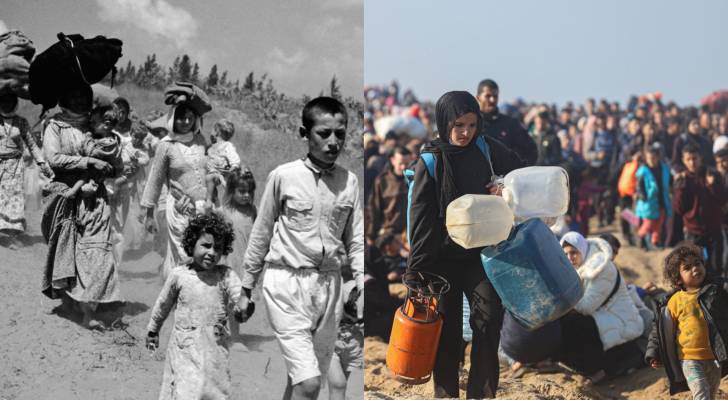Nakba in 1948 and Gaza mass displacement in 2025
From 1948 to 2025: Palestinians mark 77 years since Nakba
On May 15, 2025, Palestinians and supporters worldwide mark the 77th anniversary of the Nakba.
- What is the Nakba? -
The Nakba, a term meaning "catastrophe" in Arabic, encapsulates the displacement, dispossession, and enduring trauma experienced by Palestinians during the establishment of the Israeli Occupation in 1948.
The Nakba refers to the mass exodus of approximately 700,000 Palestinians—over half the Palestinian population at the time—who fled or were expelled from their homes during the 1947-1949 period, particularly during the 1948 Arab-"Israeli" War.
Read more: Rashida Tlaib introduces resolution for US recognition of Nakba
It is impossible to discuss the Palestinian catastrophe without examining the Balfour Declaration of 1917, a brief but consequential document that profoundly shaped the modern Middle East.
Issued on Nov. 2, 1917, by the British government, the declaration pledged support for the establishment of a "national home for the Jewish people" in Palestine, setting in motion events that led to the creation of the Israeli Occupation and the displacement of Palestinians.
Years after, a war followed the UN General Assembly’s adoption of Resolution 181 in November 1947, which proposed partitioning Palestine into separate Jewish and Arab states. The plan was accepted by Zionist leaders but rejected by Arab leaders, who argued it violated the rights of the Palestinian majority.
By early 1948, Zionist militias, such as the Haganah, Irgun, and Stern Gang, launched military operations to secure territory for the nascent Jewish state. These operations included attacks on Palestinian villages, leading to massacres like the one in Deir Yassin in April 1948, where over 100 Palestinians were killed. Such events spread fear, prompting many Palestinians to flee their homes.
- UNRWA reflects -
The United Nations Relief and Works Agency (UNRWA) released a statement commemorating the anniversary and reaffirming its longstanding support for Palestinian refugees.
In its statement, UNRWA reflected on the evolution of its mission—from a temporary emergency response to a comprehensive provider of education, healthcare, social services, and economic development. Today, the agency serves over 2.4 million registered Palestinian refugees in Jordan alone.
"From emergency food distribution centers to brick-and-mortar schools and health clinics, UNRWA has become a pillar of support for generations of Palestinian refugees," the agency said. "What began as a response to urgent need has grown into a system that creates meaningful opportunities and supports dignified lives."
Education remains at the heart of UNRWA’s work. The agency now operates 161 schools across Jordan, providing primary education to more than 100,000 students. Its curriculum incorporates technology, human rights, and conflict resolution, taught by nearly 4,000 trained educators. UNRWA also runs vocational training centers and a Faculty of Educational Sciences and Arts, boasting employment rates of over 89 percent for graduates.
On the health front, UNRWA manages 25 health centers serving more than 480,000 patients. In 2024 alone, the agency provided 1.6 million consultations, addressing acute and chronic illnesses, maternal care, mental health, and immunizations. Special attention is also given to pregnant women and high-risk cases, as well as Palestinian refugees from Syria and Gaza.
Relief efforts have also shifted over time. From distributing basic food supplies in the 1950s, UNRWA now runs quarterly cash assistance programs supporting nearly 60,000 of the most vulnerable Palestinian refugees in Jordan.
"As we remember the Nakba together, we honor the memories of all those who have suffered the plight of displacement," UNRWA stated. "We remain committed to doing our utmost to stand by the Palestinian refugees in Jordan who continue to rely on us."
- From 1948 till 2025 -
Seventy-seven years later, the Nakba remains a cornerstone of Palestinian collective memory and identity. It is not a singular event confined to 1948 but an ongoing process.
This year’s remembrance is overshadowed by the unprecedented violence in Gaza, where an ongoing military campaign has claimed over 52,928 Palestinian lives and injured 119,846 since October 7, 2023, according to the Palestinian Ministry of Health.
The convergence of these tragedies—1948’s historic dispossession and today’s devastating genocide—underscores the concept of the "ongoing Nakba," a continuous process of displacement, oppression, and loss that defines Palestinian existence.
Palestinians point to continued displacement, land confiscation, and restrictions on movement in the occupied territories as extensions of the original catastrophe. The blockade and genocide of Gaza, the expansion of "Israeli" settlements in the West Bank, and discriminatory policies against Palestinian citizens of "Israel" are seen as perpetuating the Nakba’s injustices.
The Nakba also shapes the Palestinian narrative, preserved through oral histories, literature, and art. The "key of return," symbolizing the homes left behind, is a powerful emblem passed down through generations. Annual commemorations, such as Nakba Day rallies and marches, underscore the resilience of Palestinians and their unwavering demand for justice.
- Mobilization in the US -
In commemoration, Congresswoman Rashida Tlaib (D-MI), the only Palestinian-American serving in the US Congress, reintroduced a resolution calling for the United States to formally recognize the Nakba and affirm the rights of Palestinian refugees.
Tlaib emphasized that the Nakba is not merely a historical event but an ongoing crisis. "The Nakba never ended. Today we are witnessing the "Israeli" apartheid regime carry out genocide in Gaza. It is a campaign to erase Palestinians from existence," she stated in a press release.




